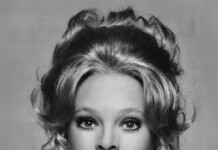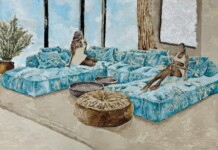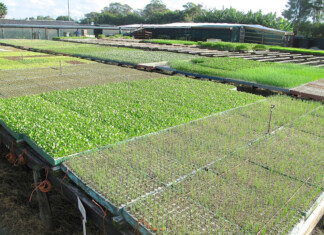Simon’s Town takes its history seriously. Apart from the Simon’s Town Museum, which has an idyllic view of the yacht moorings in the bay, there is the SA Navy Museum tucked in behind the Navy Diving School, the SAS Assegai Museum — an actual submarine — the Noorul Islam Heritage Museum and even a toy museum in a prime position on the main road.
With an urban landscape redolent of military and local cultural history, this naval port cum upmarket coastal suburb, makes the perfect setting for a literary festival.
The lineup of featured writers for Books on the Bay which took place from Mach 14 to 16, also seems like a good fit with a town steeped in narratives of warfare, enterprise and social disruption.
But Simon’s Town is also a place of tranquillity and genteel pursuits like sailing and reading.
Books on the Bay, now in its third year, is a nonprofit initiative that allows a wide range of authors a very open platform to talk about just anything related to their books.
Topics are not prescribed and this year featured among others, stories of adoption and how it feels to be adopted, what’s worth giving up or clinging to as you get older, policing in polarised communities, white supremacy and hate crime, naval warfare and what it’s like to grow up in communities shaped by religion and fundamentalism.
In other words, a thoroughly eclectic mix.
Distracted by birthdays, broken geysers and a looming niece’s wedding, I took the risky decision of letting my husband book the tickets.
Our resulting schedule had a predictable bias towards writing about war at sea, policing and politics and tricky questions of social dissonance.
I did, however, manage to leverage a booking for Charlotte Bauer, a journalist and author who I’ve followed for years.
In the matter of cartoonists Zapiro and Gado we had no beef, having both been fans for decades.

Justin Fox could not have picked a more appropriate site for his discussion of naval warfare and the adventures of the intrepid Navy skipper Jack Pembroke.
The Dockyard Chapel with its curious murals of 1970s/80s naval scenes, is remarkable.
My husband insists it was once known by local sailors and divers as the “Church Store” .
He points out that during his four years of misdirected youth at the SA Navy Diving School, he wrote dive manuals, shirked duty by hiding among the heavy rigging equipment and occasionally slept in this impressive building.
Officially, however, it exists as the former Royal Navy Mast House that dates back to 1815 and is attached to the even older Dutch Store House of 1743.
Fox is a master of the rollicking sea shanty and thrills his audience with accounts of WW2-era naval battles involving tiny, converted whaling boats up against German cruisers and treacherous U-boats, all within cannon shot of the naval base in Simon’s Town.
Much of the action was kept secret in order not to dismay the public. The catastrophic shipping losses to German and Japanese submarines were only revealed decades after the war.
Later when the tables turned, the Nationalist SA government was reluctant to credit the Royal Navy with victories against the axis forces.
For his talk on Breaking Bread: A Memoir, Jonathan Jansen, moved beyond the topic of education in transition to outline his own experience of organised religion and fundamentalist value systems.
Known as a “contrarian”, Jansen related his experience of bigotry and inequality in circumstances ranging from evangelical church communities to university boardrooms and how the concept of forgiveness can be applied.
Jansen’s humanistic persona filled the beautiful St Francis Church and for a brief moment, the reality of an increasingly polarised and self-seeking world order retreated beyond the solid wooden church doors.
In search of Charlotte Bauer, we ventured onto the slopes of the Waterfall kloof and the narrow terrace of Chapel Street that is home to the Methodist Church.
Now one of the most sought-after Simon’s Town suburbs, this settlement retains several stone military emplacements possibly linked to the aerial ropeway that once served to transport goods and people to the hospital on the mountain.

There is also an extensive but rundown tennis club and rambling but neglected naval properties that are a Simon’s Town hallmark.
Bauer’s book, How To Get Over Being Young, explores the process of losing equilibrium, influence and teeth — in other words, ageing.
She had good news for those of us whose knee and hip replacements survived the schlep up the hill.
Renovating farmhouses in France is not worth the effort and the French countryside is filled with bugs and other irritants.
Less inspiring is the advice of a French doctor, apparently an enthusiastic advocate of hormone replacement.
In evolutionary terms, this boiled down to “Your job as a woman is done and you can die now”.
Saturday evening saw the satirists Zapiro (Jonathan Shapiro) and Gado (Godfrey Mwampembwa) crowding the town hall with the lefty faithful plus a smattering of familiar artists and literary celebs.
Everyone over 60 was sheepishly sneaking a peek at their neighbour and trying to recall their name and what they looked like 30 years ago.
Or maybe that was just my spouse. Both cartoonists did fairly lengthy visual presentations of their work, explaining the context and meaning of their cartoons.
They also describe the nature and intensity of the sh*t-storm that was subsequently triggered.
Shapiro tried to figure how to be a satirist in the new world order when every new day brings a new level of weirdness and WTF moments.
Gado presented examples of the graphic novel as a form of social activism and appeared confident these will remain part of the broader literary tradition.
Both related how they have handled threats of editorial censure, defamation suits and even death threats.
Shapiro lamented the trend of criticism and insult directed towards identity (being Jewish or Muslim or gay or trans or black and so on) rather than political ideological differences.
A pointed question about offending certain religious communities elicited the clear response; for satire to work, irreverence must be absolute.
There can be no sacred cows, every religion is fair game.
The discussion began to coalesce around what became a key theme of the festival — shock and incredulity at the rise of a world order inexorably shaped by racism, intolerance and polarisation.
The theme of identity-targeting violence carried forward to the Sunday morning session with Gavin Evans.
Like many key literary figures at the festival, Evans was involved in a number of anti-apartheid organisations in the 1980s.
Unusually, he combined this with an interest in boxing. He currently lectures in media law and journalism at the University of London.
His presentation was stark — a series of direct quotes from the victims and witnesses of hate-based shootings that appear in his latest book, White Supremacy: A Brief History of Hate.
Evans unpacked the evolution of white supremacist thinking, from eugenics to Trump’s MAGA movement.
He explained the link between misogyny and racism and generated considerable discussion and some foreboding about what future Trump-shaped societies will bring.
Evans is a lively figure however, and managed to lift the tone with news of several studies that suggest that while politicians seem to be shifting to the right, people and communities are becoming less racist.
Rounding out the festival was Andrew Brown — an author my husband will froth about endlessly.
Brown is evidently an adrenaline junkie seeking out geopolitical conflict in the Sudan, Israel and the Ukraine.
He remains steadfastly among that rare breed of journalist who persists in believing that media exposure can make things better.
His writing is immersive — he insists on getting his hands dirty as a police reservist and advocate and has an obvious fascination with policing and law enforcement as functions of societal justice.
Brown’s latest novel, The Bitterness of Olives, deals with contemporary Palestine and two figures in law enforcement whose lives intersect from opposing sides of the political divide.
The book was nearly canned because Brown feared that the Hamas attacks in October 2023 and the consequent military reaction by Israel rendered it unpublishable.
Brown tackled fraught questions of being Jewish, Zionism and attempting to write in a balanced way about Israel and Palestine.
He also dealt with the question of whether civilians should be immune from attack even though they live and possibly benefit from an unjust state.
Like Zapiro, Brown has a particularly clear critique of identity increasingly being conflated with questions of morality and belief.
One of the surprises of the Books on the Bay festival was that it dragged the audience into the hard realities of a world plagued by populism and tribal-like politics even though most of the books are novels.
It was a relief to realise that you are not some paranoid worrywart obsessed with what Trump’s next outrage may bring.
But it was also scary to hear that so many bright and insightful writers and social commentators have the same level of fear and feelings of helplessness.
Weekender








